Funny Retro Television Commercial Man Sinks Boys Sailboat
How a baker survived the Titanic sinking by getting really drunk
Charles Joughin was one of the disaster's most unlikely survivors and he did it thanks to industrial amounts of liquor
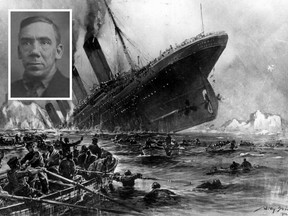
Monday, April 15th, 2019 marks the 107th anniversary of the sinking of the RMS Titanic 500 kilometres southeast of Newfoundland. Below, a repost of a 2017 feature about one of the disaster's most unlikely survivors: Chief baker Charles Joughin.
They were supposed to be figuring out how the world's largest ocean liner had sunk.
But instead, one of the members of the British Titanic inquiry was grilling a survivor on how tipsy he'd been at the time of the disaster.
"This is very important," said the questioner, shushing the wigged Wreck Commissioner when asked the purpose of this booze-related interrogation. "I think his getting a drink had a lot to do with saving his life."
Before the inquiry sat Charles Joughin, the chief baker of the RMS Titanic and one of the most remarkable survival stories of that fateful night.
The baker had nonchalantly stepped off the stern of the sinking liner. Then, as 1,500 screaming, panicked souls drowned and froze to death around him, Joughin calmly paddled around until dawn. After being fished out by a lifeboat, he was back at work within days.
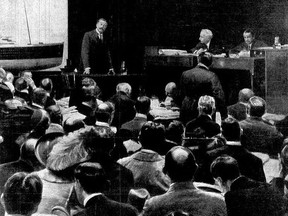
It was an almost physiologically impossible feat of survival. And, according to the British Titanic inquiry, it was because the 33-year-old Englishman had the presence of mind to greet history's greatest maritime disaster by getting smashed.
To be sure, a good rule of thumb is that a drunk man will usually freeze to death faster than a sober man.
The warming sensation of a glass of brandy (and the telltale red cheeks that sometimes results) is caused by vasodilation, the phenomenon of warm blood rushing to the surface of the skin.
In a survival situation, having all that warm blood away from the vital organs means that the drinker is at greater risk of hypothermia.
However, Canadian hypothermia expert Gordon Giesbrecht figures that in the -2 C temperature of the North Atlantic, the water was cold enough to quickly tighten Joughin's blood vessels and cancel out any effect of the alcohol.
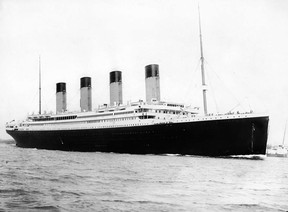
"At low to moderate doses of alcohol, cold will win out," said Giesbrecht, a University of Manitoba professor who has performed hundreds of cold-water immersion studies.
What Joughin would have had, however, is the awesome, life-saving power of liquid courage.
Alcohol remains a leading cause of humans getting into fatal situations, including freezing to death. Nevertheless, the relaxing qualities of the drug have long been known to give humans an uncanny ability to survive trauma.
A recent study looked at 14 years of Illinois hospital data and found that stab and gunshot victims were more likely to survive the more inebriated they were.
"In an ER, cold patients who are really drunk can walk in and they're conscious at a temperature that they shouldn't be," said Giesbrecht.
And indeed, Joughin's actions that night speak to a man unfazed by impending disaster.
Immediately after hearing the collision with an iceberg, the chief baker leapt out of his bunk and began dispatching his staff to stock the lifeboats with bread and biscuits.
This done, he popped back into his cabin for a drink before heading topside to help load lifeboats.
Not only did Joughin refuse his own place in a boat, but he and a few other men began forcibly chucking reluctant women into empty seats, likely saving their lives.
"We threw them in," he testified later.
The top deck of the increasingly listing Titanic was mostly cleared of lifeboats by 1:30 a.m. To most, this was a panic-inducing sign that all hope of rescue was gone. But to Joughin, it was a cue to head back to his cabin for another drink.
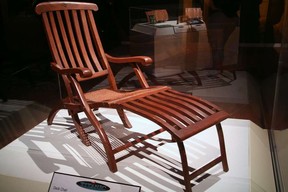
"He sat down on his bunk and nursed it along — aware but not particularly caring that the water now rippled through the cabin doorway," wrote historian Walter Lord in A Night to Remember. Lord was in touch with Joughin just before the baker's 1956 death.
Joughin then splashed topside again, where he took it upon himself to begin throwing deck chairs overboard, with an eye to filling the water with impromptu floatation devices.
Parched, he then worked his way back to his pantry to get a drink of water.
The baker was standing on the stern when the ship broke in half. And yet, he remembered the violent, catastrophic breakup only as a "great list over to port."
"There was no great shock or anything," he told the inquiry.

Deftly moving through swarms of people, Joughin made it to the stern rail of the ship. At exactly 2:20 a.m., he rode the sinking Titanic into the sea like an elevator.
As with all surviving Titanic crew members, 2:20 a.m. on April 15, 1912, was also the exact moment at which the White Star Line stopped paying him.
The first stage of cold water immersion is known as "cold shock," the horrifying sensation of having the skin cool. The feeling is what the Titanic's second officer, Charles Lightoller, described as being "like a thousand knives being driven into one's body." Common side-effects include gasping and hyperventilation.
Even today, the myth persists that the human body cannot withstand more than a few minutes in the ocean. Thus, many people thrown into the sea assume that cold shock is the icy grip of death closing around them.
In reality, the cold shock ends after 90 seconds. Even in the winter waters of the North Atlantic, an average-sized adult still has 10 minutes before going numb and at least an hour before the heart stops.
"The average adult is a big chunk of meat and it takes a lot of energy to cool it off," said Giesbrecht.
Regardless, cold shock was a stage that many Titanic victims did not survive. In the panicked flailing of those first minutes, many drowned or dramatically sped up their loss of body temperature.
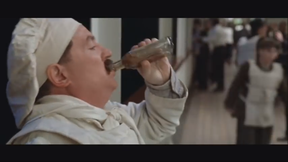
But Joughin, who had made sure to cinch his lifebelt before going in, met the ice-choked North Atlantic with a stiff upper lip of almost mythic proportions.
"I was just paddling and treading water," he testified.
Brock University's Stephen Cheung is another leading Canadian expert in hypothermic responses. While he is certainly not in the camp to advocate alcohol as an antidote to shipwrecks, he noted that the effect on Joughin would have been to "increase or bolster his courage."
"It would also decrease his feeling of cold, so he may have indeed been more fearless and not feeling as cold and therefore as panicked," he wrote in an email to the National Post.
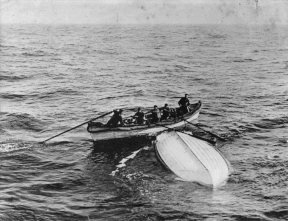
The baker, in fact, had unwittingly become a textbook example of how to survive a shipwreck.
First, he delayed immersion; among those who went into the water that night, Joughin was the absolute last to get wet.
Second — and most important — he managed to stay calm and strategize a way out of the water.
This is a tragedy seen all too frequently by first responders: the disaster victims who panic and die while their salvation is right in front of them. The lost hiker who walks right past a trail; the fire victim who pushes rather than pulls on a fire exit; the aircraft pilot who misses the single button that would prevent a fatal crash.
Joughin spent nearly two hours floating in darkness. Then, he used the first rays of dawn to spot an overturned lifeboat set adrift in the Titanic's chaotic final minutes.
He paddled over, pulled himself out of the water and was eventually hauled to safety by a passing lifeboat.
When he was brought aboard the rescue ship RMS Carpathia, Joughin was essentially fine. "I was all right barring my feet, they were swelled," he testified.
Given the circumstances, Giesbrecht said that the only step Joughin missed was to put on more clothing. Extra layers — even wet layers — slow down the loss of body heat.
Joughin returned to ship baking and worked long enough that he made bread aboard Second World War troopships.
Although he gave few interviews, the comic relief of the "drunk baker" has featured in multiple fictionalized accounts of the disaster, including the 1997 blockbuster Titanic. And naturally, Joughin's saga was chronicled in a 2016 episode of the series Drunk History.
But while scholars have obsessed about the boozy reputation of Charles Joughin, beneath it all might simply have been a man unwilling to die.
"It's impossible for scientists to predict who will perform and respond well to extreme situations," noted Cheung.
"Some people give up very quickly, others you just cannot seem to kill."
• Email: thopper@nationalpost.com | Twitter: TristinHopper


Source: https://nationalpost.com/news/canada/charles-joughin-titanic-anniversary-april-15-drunk

0 Response to "Funny Retro Television Commercial Man Sinks Boys Sailboat"
Post a Comment